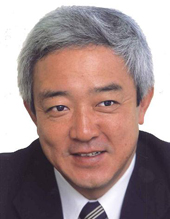Ryu Matsumoto
Ryū Matsumoto ( Japanese 松本 龍 , Matsumoto Ryū ; born May 17, 1951 in Fukuoka , Fukuoka Prefecture ; † July 21, 2018 there ) was a Japanese politician of the Democratic Party ( Yokomichi group ) and from 1990 to 2012 a member of the Shūgiin , the lower house of parliament . In Naoto Kan's cabinets, which were transformed for the first and second time , he was Environment Minister and Minister of State for Disaster Management .
Matsumoto studied political science at the law faculty of Chūō University and in 1980 became secretary in his father's office of representatives. In the Shūgiin election in 1990 , Matsumoto himself stood as a candidate for the Socialist Party of Japan (SPJ) in the then five-mandate constituency of Fukuoka 1, when the long-time SPJ MP Tadashi Kawano there withdrew from politics. Matsumoto was elected with the second highest percentage of votes, confirmed in 1993 and re-elected five times in the new Fukuoka 1 constituency from 1996 for the Democratic Party . In Shūgiin he was, among other things, chairman of the special committee for the relocation of parliament in 1996 and chairman of the environmental committee in 2000. In the Democratic Party, he was chairman of the election strategy commission in 2001 and chairman of the general assembly of both parliamentary groups in 2009 and 2010.
In September 2010, party chairman Naoto Kan Matsumoto appointed Environment Minister and Minister of State for Disaster Management to his reshaped cabinet . In June 2011 he handed over the Ministry of the Environment to Justice Minister Satsuki Eda and was given the newly created responsibility for the "Reconstruction measures after the Great East Japanese Earthquake " ( 東 日本 大 震災 復興 対 策 , Higashi-Nihon daishinsai fukkō taisaku ). He stayed in office for eight days, before causing a public outcry and resigning by speaking to the governors of the affected prefectures of Iwate and Miyagi. The previous Secretary of State Tatsuo Hirano was his successor as Minister of Disaster Control and Reconstruction .
In the Shūgiin election 2012 , Matsumoto received 36,632 votes in the constituency of Fukuoka 1, with 18.3% only the third-highest share of votes after Takahiro Inoue ( LDP ) and Hibiki Takeuchi ( Minna no Tō ). With this constituency result, he landed on the proportional representation list of the Democrats in Kyūshū in 19th place and also clearly missed re-election in the bloc. When Shugiin-election in 2014 , he has not raced for more and died on July 21, 2018 in a hospital in Fukuoka at the age of 67 years to lung cancer .
family
Matsumoto's grandfather Jiichirō was the founder of the Buraku Kaihō Dōmei , the "Federation for the Emancipation of the Buraku ", for which he is considered the father of the movement; He was also from 1936 Shūgiin MP and in 1947 the first Vice President of the Sangiin , the elected upper house under the post-war constitution. His father Eiichi was a member of the SPJ in Sangiin for 26 years. His brother Yūzō runs the family-owned construction company Matsumoto-gumi in Fukuoka.
Web links
- Official Website (Japanese)
- 国会 議員 情報 . In: Jiji Tsūshin . 2010,Retrieved September 17, 2010(Japanese).
Individual evidence
- ↑ a b 松本 龍 ・ 元 環境 相 死去 67 歳 復興 相 時 に 批判 受 け 引 責 . In: Asahi Shimbun . July 21, 2018. Retrieved July 21, 2018 (Japanese).
- ^ Reconstruction minister quits after week. Matsumoto exit over outbursts puts Kan Cabinet in deeper mess. In: The Japan Times . July 5, 2011, accessed July 5, 2011 .
| personal data | |
|---|---|
| SURNAME | Matsumoto, Ryu |
| ALTERNATIVE NAMES | 松本 龍 (Japanese) |
| BRIEF DESCRIPTION | Japanese Democratic Party (Yokomichi Group) politician |
| DATE OF BIRTH | May 17, 1951 |
| PLACE OF BIRTH | Fukuoka , Fukuoka Prefecture |
| DATE OF DEATH | July 21, 2018 |
| Place of death | Fukuoka , Fukuoka Prefecture |
